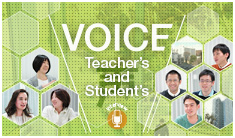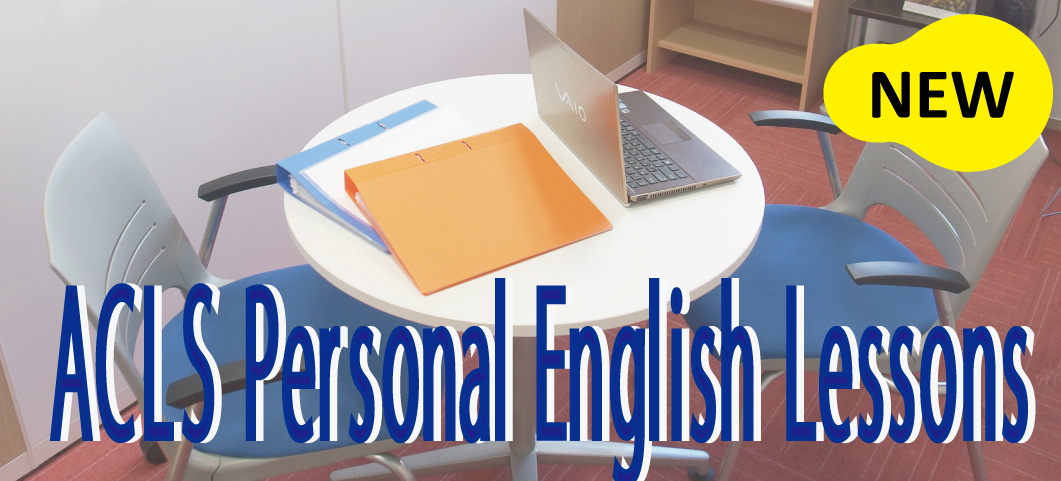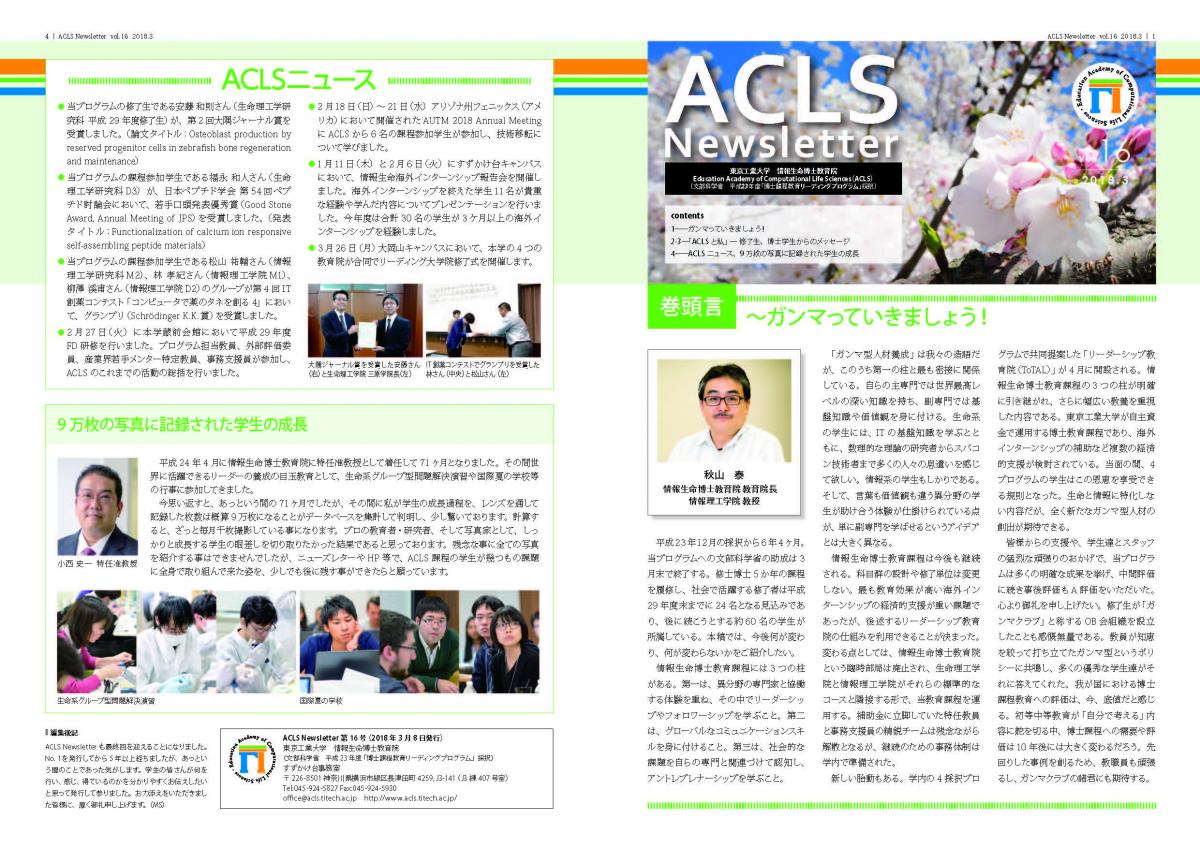- Home
- Teacher's and Student's voice
- Motonori Imamura / Masahiro Yano
Motonori Imamura / Masahiro Yano


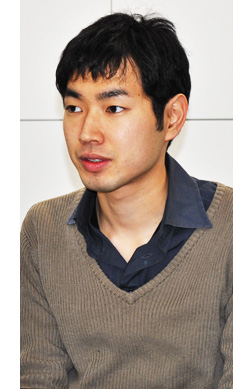 Imamura: I come from a biology background. My research is designed to be used as a template for the application of molecular biology to nanotechnology. When I made the decision to pursue this area of research, I realized that I would need not just biological knowledge but also knowledge about information technology. When I heard that the ACLS program offered just this sort of thing, that was the impetus for me to join it.
Imamura: I come from a biology background. My research is designed to be used as a template for the application of molecular biology to nanotechnology. When I made the decision to pursue this area of research, I realized that I would need not just biological knowledge but also knowledge about information technology. When I heard that the ACLS program offered just this sort of thing, that was the impetus for me to join it.
At ACLS, they implement an educational philosophy designed to produce "Γ -type" specialists. Before I came here, if you had to call me something, it would have been "I -type". So for me, the opportunity to study different fields was a big attraction.
Yano: Even when I was an undergraduate, we carried out research using computers to do things like analyzing soil samples to determine the types of bacteria in the environment. This work was basically lumped under the field of life sciences, but I guess it was using what you would call information related themes and methods. So I think that joining ACLS which is an area of fusion between life sciences and information technology, was probably an inevitability for me.
Imamura: Even in the field of biology, there are many opportunities to apply statistical and mathematical methods. If I had gone on without studying knowledge from other fields, I would be carrying out my research solely relying on existing tools (Excel and analysis software). By joining ACLS, I figured I would be able to learn the kind of ideas that went into creating these programs. By applying mathematical methods to my research, instead of just relying on the existing tools, I hoped I would be able to widen the scope of my research.
Yano: The ACLS program is a comparatively new field of study that combines biology and information technology. I thought that in a field with many undeveloped themes, it would be easy to produce something new.

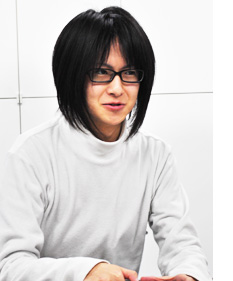 Yano: I feel strongly that coming into contact with various fields broadens your perspective. Even when focusing narrowly on one particular theme, you can still thoroughly analyze it from various different angles in order to work out the best way to proceed. I have the feeling that the problem of how best to tackle your own research theme, in order to make effective progress in your research, becomes easier to solve when you absorb knowledge from outside the laboratory.
Yano: I feel strongly that coming into contact with various fields broadens your perspective. Even when focusing narrowly on one particular theme, you can still thoroughly analyze it from various different angles in order to work out the best way to proceed. I have the feeling that the problem of how best to tackle your own research theme, in order to make effective progress in your research, becomes easier to solve when you absorb knowledge from outside the laboratory.
Imamura: Right now, I have a lot of things to study, and I haven't reached the stage of being able to apply them to my research yet. However, I feel even more impressed by the program than I thought I would be when I started. To me, the IT strand of the education here appears to be like a distant small island, or like the serif on the end of the horizontal arm of the 'Γ' symbol. Linking my own research and the things I have learned at ACLS to make a 'Γ' is difficult, but I feel that interacting with people from different fields has expanded the possibilities for new research. Instead of drawing only on my own resources, now I am able to explore various possibilities in collaboration with students from other fields. That is the big attraction of the program for me.
Yano: By broadening your interaction with other fields, I think you reduce the amount of time you spend holed up in your own lab fixated on a single thing. By studying other fields, I do feel that on the surface it looks like you are increasing the work you have to do, but actually, by acquiring multiple viewpoints, I now think that it becomes easier to find creative openings into your research.

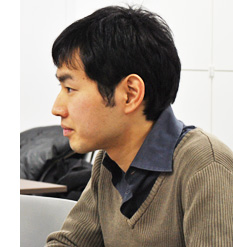 Imamura: Pursuing your own research, while studying subjects in both your specialist field and ACLS at the same time, definitely has its difficult moments. Since I was taking part in the program at the same time as I was completing my PhD, it was a really busy year for me. However, I think that students who join the program while they are studying there for their Masters should be able to study both courses at once with no problems if they allocate their time in a well-balanced fashion.
Imamura: Pursuing your own research, while studying subjects in both your specialist field and ACLS at the same time, definitely has its difficult moments. Since I was taking part in the program at the same time as I was completing my PhD, it was a really busy year for me. However, I think that students who join the program while they are studying there for their Masters should be able to study both courses at once with no problems if they allocate their time in a well-balanced fashion.
Yano: Rather than finding it difficult, I actually thought it was extremely valuable. In reality, before I actually took part in ACLS, I didn't have high hopes for the curriculum (laughs). Particularly in regard to programming, where I had a lot of confidence in the abilities I had built up through my own study. But when I actually took part in the ACLS course, I found that my study of things such as network infrastructure, which I had often heard people say was difficult to study on your own, actually proceeded relatively smoothly. I was really grateful to the course for lowering the difficulty threshold for things like that, that were difficult to study on your own.
Since units of study in the program took place in the gaps between research, it allowed me to enjoy a change of pace by coming into contact with other fields, which was an unexpectedly good thing. It did repeat things I had done before, but the exposure to other fields made it easier to stake a claim to my own territory that nobody had touched before, so research became that much easier.

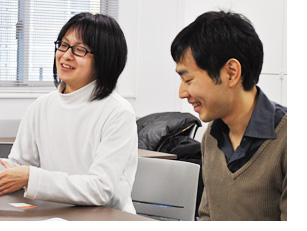 Imamura: We started preparations for last year's summer school (note 1) in June. The organizing committee was composed of 5 PhD students and 2 Masters students. Together we got to grips with organizing the schedule for September's school. Other universities and educational institutions also carry out similar programs. However, the one that ACLS holds was our first, so our planning went ahead on the basis of a debate every week that all the committee members took part in, even the teaching staff, about what form we thought the event should take.
Imamura: We started preparations for last year's summer school (note 1) in June. The organizing committee was composed of 5 PhD students and 2 Masters students. Together we got to grips with organizing the schedule for September's school. Other universities and educational institutions also carry out similar programs. However, the one that ACLS holds was our first, so our planning went ahead on the basis of a debate every week that all the committee members took part in, even the teaching staff, about what form we thought the event should take.
The first thing we had to think about was coming up with a clear goal. In doing this we came up with the catchphrase "Cross X Challenge". This comprised our two goals of interchange that crossed the boundaries between the humanities and the sciences ("Cross"); and taking on new challenges ("Challenge"). We were careful to make sure that everyone, including participants from overseas, people from other fields and other cultures, and people using other languages, would all be able to take part in meaningful debate and interaction.
While we were pushing ahead with the actual work of the preparations, I found myself struggling to answer the question of what role the leader, who was responsible for bringing everything together, should play. You see, I'd never had any previous experience of leadership. However, by setting clear goals, and making clear what each meeting had to decide, I think we succeeded in creating a good summer school.
One thing I realized after my experience as head of the organizing committee, was that my opportunities for interchange were widened even further. Being interviewed like this, was also something that never happened to me much before (laughs). I've had a lot of attention focused on me in all sorts of ways. Before this, I never had that many chances to speak to other students outside my year group and laboratory. So the fact that through these group classes and through the summer school I was able to meet and exchange ideas with all kinds of different people, was a really big thing.
Yano: The school to be held in summer of this coming year will take place in London. The schedule including events to be held before and after it, will take one week, so it is going to be much longer than last year. Because there is more time this year, in addition to the poster session and guest lectures that were held last year, we are also coming up with various other additional plans which we intend to put in place.
Imamura: Compared to last year, there is more time this year for preparation, so by doing things like teleconferencing with overseas students, and assembling the opinions of lecturers, and students other than the organizing committee members (about what they want to see happen, and how to achieve it), they should be able to produce a more significant result.
Yano: Yes. It also depends on what the other committee members think, but I actually think the level of achievement of last year’s event (The Cross Challenge one) was not actually all that high. Somehow or other, Japanese university students put together somehow have a tendency to freeze up, you know. The question is how to "unfreeze" them. I have come up with a range of strategies that I intend to use.
(Note 1) The summer school (ACLS International Summer School) is an event carried out for the purpose of debate and interchange between researchers and students of various fields. The 2012 event was held from the 3rd to the 5th of September at Shonan International Village in Kanagawa.

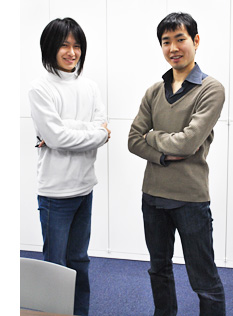 Imamura: My goal is to become a pioneer. Most of the things I learned at ACLS were things that could not be learned in the laboratory or in specialist courses, so I intend to become a pioneer who acts as an agent of change in the laboratory, and goes on to open up new areas of study.
Imamura: My goal is to become a pioneer. Most of the things I learned at ACLS were things that could not be learned in the laboratory or in specialist courses, so I intend to become a pioneer who acts as an agent of change in the laboratory, and goes on to open up new areas of study.
Yano: By bringing viewpoints and ways of thinking from different fields into the laboratory, you are taking on the burden of future research… I think that kind of leadership is what we need.
- So you aim to go from being a "Γ- type" shape to a 'Π -type" shape?
Yano: No, that's not it. Though I think that there are people who hold to the ideal that people who study various different fields will become a 'Π' shape with deep specializations in multiple disciplines. However, at ACLS there are not many people who think that way. There is no need to be able to do everything yourself in every single field. What I think is important is to maintain a connection with people in those other fields while you are working in it. I think that cooperating effectively with people in other fields is what the serif on the end of the horizontal arm of the ‘Γ’ is there for.
Imamura: I think there's also a way of thinking that says you ought to increase the number of the serifs on the end of the horizontal arm of the 'Γ' symbol. That you ought to have not only one upright stroke, but two, or even three. Even if the lengths, or the depths, are not equal. I think that increasing the boundaries of what you know, and what you understand, is essential to producing original research. Afterwards, you can further extend them again as necessary. I think that is also possible.
- So, that is, maintaining the depth of knowledge in your specialist field, while increasing your knowledge, and experience of studying, other fields?
Imamura: In Japan, we refer to our doctoral degrees just as a "Doctor's", but overseas it is actually called a Doctor of Philosophy (PhD). There are many people in my laboratory who have obtained a PhD degree overseas, have expertise in broad range of areas, including the humanities, are responsible for research, having a deep knowledge of their subject area, and yet are still very open-minded. The goal of what we study at ACLS is to produce someone who could really be called a PhD.
Yano: When I hear the stories of outstanding people, you can almost certainly say they have their own individual worldview. They say things like "living things should function in this way, so that means this gene should look like that". Where does this worldview come from? When you listen to them talk, it usually turns out that they read a philosopher like Wittgenstein, or someone like that. I think that by continuing to maintain an interest in a wide range of fields, I would like to become a researcher with a worldview too.
(Note) The contents of this article are accurate as of the time the interview was conducted in February 2013.






